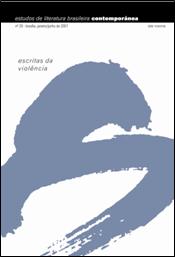Entre vítima e perpetrador:
a identidade problemática da segunda geração pós- Shoá na Alemanha e a proposta do romance O leitor, de Bernhard Schlink
Abstract
O romance O leitor, de Bernhard Schlink, foi um best seller excepcional da literatura alemã contemporânea. Depois recebeu muitas críticas por representar a história do holocausto de forma distorcida. O artigo defende que o tema central do livro não é o holocausto, mas a relação entre a geração dos pais nazistas e seus filhos. Até a publicação de O leitor, a atitude dominante frente à geração da guerra não era de compreensão, mas de censura. O romance constrói um enredo no qual o amor do protagonista proíbe esse comportamento e estabelece um processo que permite uma compreensão do perpetrador que não implica o perdão dos seus atos. Essa revisão se fez necessária para incluir a geração dos culpados na identidade coletiva alemã e, dessa forma, realmente assumir a responsabilidade histórica.
References
ADLER, Jeremy. “Die Kunst, Mitleid mit den Mördern zu erzwingen. Einspruch gegen ein Erfolgs-buch: Bernhard Schlinks Der Vorleser betreibt sentimentale Geschichts-fäl-schung”. Süddeutsche Zeitung, 20 abr. 2002 (Ursprünglich in Times Literary Supple-ment).
ASSMANN, Jan. Das kulturelle Gedächtnis: Schrift Erinnerung und politische Identität in frühen Hochkulturen. München: Beck, 1992.
______. Religion und kulturelles Gedächtnis: Zehn Studien. München: Beck, 2000.
DONAHUE, William Collins. “Illusions of Subtlety: Bernhard Schlink’s Der Vorleser and the Moral Limits of Holocaust Fiction”. German Life and Letters 54, nº. 1, 2001, pp: 60-81.
GALLE, Helmut. “Von der Bestie zur Geliebten: Die Nazi-Täter im Spiegel der Literatur”. Atas do IV Congreso argentino de profesores de alemán (no prelo).
______. Von der Bestie zur Geliebten: Entwicklung des literarischen Bildes vom Nazitäter in der deutschsprachigen Literatur (a ser publicado).
HAGE, Volker. “Autoren unter Generalverdacht”. Spiegel online, 10 abr. 2002.
JASPERS, Karl. Die Schuldfrage: Von der politischen Haftung Deutschlands. München: Piper 1996.
NORA, Pierre. Zwischen Geschichte und Gedächtnis. Frankfurt a. M.: Fischer, 1998 (Le lieux de mémoire).
NORFOLK, Lawrence. “Die Sehnsucht nach einer ungeschehenen Geschichte. Warum Bernhard Schlinks Roman Der Vorleser ein so schlechtes Buch ist und allein sein Erfolg einen tieferen Sinn hat”. Süddeutsche Zeitung, 27 abr. 2002.
RÜSEN, Jörn. Zerbrechende Zeit: Über den Sinn der Geschichte. Köln/Weimar/ Wien: Böhlau, 2001.
SCHLINK, Bernhard. Der Vorleser. Zürich: Diógenes, 1997.
______. O leitor. Trad. de Pedro Süssekind. Rio de Janeiro: Nova Fronteira, 1998.
______. Vergangenheitsschuld und gegenwärtiges Recht. Frankfurt a. M.: Suhrkamp, 2002.
WINKLER, Willi. “Vorlesen, Duschen, Durcharbeiten Schlechter Stil, unaufrichtige Bilder: England begreift nicht mehr, was es an Bernhard Schlinks Bestseller Der Vorleser fand”. Süddeutsche Zeitung, 30 mar. 2002.
Downloads
Published
Issue
Section
License
Authors who publish in this journal agree to the following terms:
a) The authors maintain the copyright and grant the journal the right of first publication, the work being simultaneously licensed under the Creative Commons Attribution License-Non Commercial 4.0 which allows the sharing of the work with acknowledgment of the authorship of the work and publication this journal.
b) Authors are authorized to enter into additional contracts separately, for non-exclusive distribution of the version of the work published in this journal (eg publish in institutional repository or as a book chapter), with authorship recognition and publication in this journal.
c) Authors are allowed and encouraged to publish and distribute their work online (eg in institutional repositories or on their personal page) after the editorial process, as this can generate productive changes, as well as increase the impact and citation of published work (See The Effect of Free Access).
d) The authors of the approved works authorize the magazine to, after publication, transfer its content for reproduction in content crawlers, virtual libraries and the like.
e) The authors assume that the texts submitted to the publication are of their original creation, being fully responsible for their content in the event of possible opposition by third parties.


